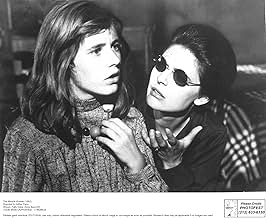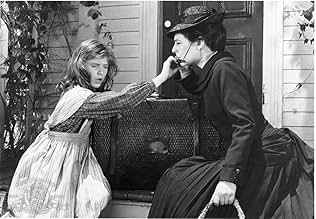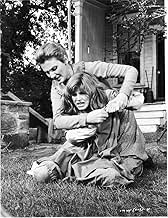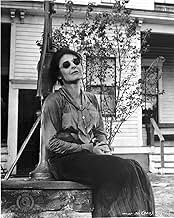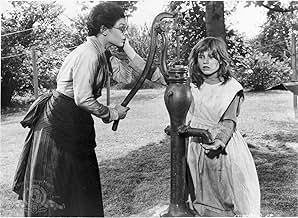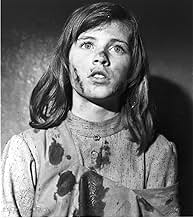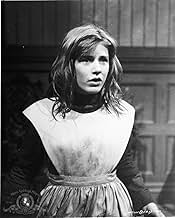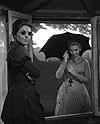CALIFICACIÓN DE IMDb
8.1/10
22 k
TU CALIFICACIÓN
La historia de la lucha de Anne Sullivan por enseñar a la ciega y sorda Helen Keller a comunicarse.La historia de la lucha de Anne Sullivan por enseñar a la ciega y sorda Helen Keller a comunicarse.La historia de la lucha de Anne Sullivan por enseñar a la ciega y sorda Helen Keller a comunicarse.
- Ganó 2 premios Óscar
- 13 premios ganados y 13 nominaciones en total
Maribel Ayuso
- Undetermined Role
- (sin créditos)
Dale Ellen Bethea
- Martha at Age 10
- (sin créditos)
John Bliss
- Admissions Officer
- (sin créditos)
Grant Code
- Doctor
- (sin créditos)
Michael Darden
- Percy at Age 10
- (sin créditos)
Michele Farr
- Annie at Age 10
- (sin créditos)
William F. Haddock
- 2nd Crone
- (sin créditos)
Jack Hollander
- Mr. Anagnos of Perkins School in Boston
- (sin créditos)
Alan Howard
- Jimmie at Age 8
- (sin créditos)
Judith Lowry
- 1st Crone
- (sin créditos)
Helen Ludlam
- 3rd Crone
- (sin créditos)
Beah Richards
- Viney - Keller Maid
- (sin créditos)
Opiniones destacadas
Although I am a long-time Patty Duke admirer, and thus far from objective, this film still stands the test of time. This is the kind of filmmaking that prompted me to fall in love with the movies. Brilliantly inspired writing by William Gibson, from his equally inspired play. Intelligent, austere direction by Arthur Penn (one of the true gentlemen and masters of the American cinema); Penn had the sense to retain the inate artistry and grit of the original stage play and simply allow the camera to capture the actors' intuitive - albeit, well rehearsed, performances, recreating their stage roles which generated an unheard-of 19 curtain calls when it first graced the stage in its Philadephia opening. The film, in stark, black and white, speaks total reality to the film audience of 1962 - and, of course, well beyond that year. Finally, one would be hard pressed to think of another film that so exquisitely defines the term "2-character" study. Bancroft and Duke deliver A-plus, no bones about it, top-drawer, performances. It is a film about the undaunted human spirit and our need to communicate. Although much has been written about 11-minute breakfast donneybrook, which is certainly wonderful cinema to behold, the entire film is breathtaking from opening credits to the final scenes. I dare anyone to even breathe during the climactic water pump scene when teacher Annie Sullivan finally "connects" and communicates with her "unreachable" charge, the deaf, blind, young Helen Keller. It's an absolutely astonishing, "can't take your eyes off it," moment of celluloid. Duke, Bancroft and Penn worked beatifully to create this incredibly touching masterpiece of dramatic filmmaking, which is not without its moments of "comedy," as all fine dramas are capable of conveying. It is a film which breathes life - and it is especially brought to life by two of the best actresses America has ever produced. The Miracle Worker is a story and film portraying real human courage, patience and individual, personal will. It continues to live in my memory as a work of art that has rarely been equalled before - or since - on screen.
This movie made a strong impression on me when I saw it on Tv as a lad and I have revisted it a few more times but it had been a decade since i saw it last and my daughter had a done a book report on Helen Keller recently and was very moved by her story and I mentioned the Miracle Worker, so we rented it and viewed it tonight and it still packs a wallop and the performances are first rate. Patty Duke won the best supporting oscar that year and deserved it (even though she beat out Mary Badham who played Scout in To Kill A Mockingbird -- what a year for young actresses!!!)and Anne Bancroft is amazing as the tough, determined Anne Sullivan. A wonderful film.
I bought this movie after having not seen it for a while, and watching it again was intensely powerful. I had never cried during the "water" scene, but I did this time. The scene in the dining room is magnificently filmed and exhausting to watch...to think Patty Duke and Anne Bancroft performed that scene every night on Broadway! Supposedly they wore multiple layers of padding. I don't know why they didn't create a new category for the Oscars that year, Best Double Performance in Leading Roles. They both richly deserved the Oscars they won, but I really couldn't choose between a leading role and a supporting role in that movie since Duke and Bancroft created such a beautiful and moving partnership. Having read a great deal about Helen Keller, including her own autobiography, I am still always amazed by her story and accomplishments. This movie is a brilliant testament to human strength.
I'm not certain if it was fate but it is very interesting that I had the chance to finally see "The Miracle Worker" a few days after the sad news of the death of Anne Bancroft.
The film, based on the play by William Gibson, is an extremely well-acted film, brilliantly opened up on the big screen. Anne Bancroft as teacher Annie Sullivan and Patty Duke as young Helen Keller are outstanding. Sullivan's determination to communicate to the deaf and blind Helen made for a compelling story on stage as well as on screen.
I understand that when Hollywood wanted to make this movie, the powers-that-be did not want Bancroft or Duke. After finally seeing the movie, I'm glad that director Arthur Penn and producer Fred Coe chose to make this movie outside the so-called Hollywood establishment.
One scene that was discussed in some other posts was the dining room in which Sullivan forces Helen to eat food from a spoon and not her hands. It almost felt like I was watching a fierce wrestling match. It was a physical, as well as an emotionally draining, sequence. A battle of wills between teacher and the unwilling student. It was brilliantly edited and directed.
The film was not without faults. According to the IMDb, a number of flashback scenes were filmed in their entirety but did not work out very well. Those scenes were incorporated within the movie and it looked rather clumsy. The scenes could have been easily edited out completely.
As with all plays adapted to the big screen, some scenes were a little bit stagy. But that involved just a few scenes and, overall, it did not ruin the movie.
What I really liked about the movie was that the filmmakers were very successful at not succumbing to sentiment. This movie could have easily been very corny and sappy. Perhaps Bancroft and Duke and their performances had something to do with that.
I've been a fan of Anne Bancroft for many years and I'm very glad that I had the chance to see her well-deserved Oscar-winning performance.
RIP Ms. Bancroft.
The film, based on the play by William Gibson, is an extremely well-acted film, brilliantly opened up on the big screen. Anne Bancroft as teacher Annie Sullivan and Patty Duke as young Helen Keller are outstanding. Sullivan's determination to communicate to the deaf and blind Helen made for a compelling story on stage as well as on screen.
I understand that when Hollywood wanted to make this movie, the powers-that-be did not want Bancroft or Duke. After finally seeing the movie, I'm glad that director Arthur Penn and producer Fred Coe chose to make this movie outside the so-called Hollywood establishment.
One scene that was discussed in some other posts was the dining room in which Sullivan forces Helen to eat food from a spoon and not her hands. It almost felt like I was watching a fierce wrestling match. It was a physical, as well as an emotionally draining, sequence. A battle of wills between teacher and the unwilling student. It was brilliantly edited and directed.
The film was not without faults. According to the IMDb, a number of flashback scenes were filmed in their entirety but did not work out very well. Those scenes were incorporated within the movie and it looked rather clumsy. The scenes could have been easily edited out completely.
As with all plays adapted to the big screen, some scenes were a little bit stagy. But that involved just a few scenes and, overall, it did not ruin the movie.
What I really liked about the movie was that the filmmakers were very successful at not succumbing to sentiment. This movie could have easily been very corny and sappy. Perhaps Bancroft and Duke and their performances had something to do with that.
I've been a fan of Anne Bancroft for many years and I'm very glad that I had the chance to see her well-deserved Oscar-winning performance.
RIP Ms. Bancroft.
Arthur Penn's superb, emotionally devastating screen version of William Gibson's play about the early life of Helen Keller and of how a great dedicated teacher, Annie Sullivan, dragged her kicking, if not necessarily screaming, out of her world of darkness. Penn's style is spare and unsensational, (even finding a good deal of humour in the early encounters between teacher and pupil; deaf, dumb and blind Keller may be but she is as wily as a cat and runs rings round Sullivan). The black and white images are straightforward and uncluttered and have the power of the images in silent cinema. As Sullivan and Keller, Anne Bancroft and Patty Duke are both astonishing. There is a rapport between these two actresses that seems to transcend mere 'acting' and raises the film to an altogether higher, more deeply moving plain.
¿Sabías que…?
- TriviaMark Twain was the first person to refer to Anne Sullivan as "the miracle worker". Twain was a friend of Helen Keller.
- ErroresAnnie Sullivan has to look up the word discipline in a dictionary later in the film even though she's used it in a letter near the beginning; however, she remarks that she must know how to spell it before teaching it to Helen, and may have simply used her best guess in the letter since nothing was at stake.
- Citas
Annie Sullivan: Pity? For this tyrant? The whole house turns on her whims! Is there anything she wants she doesn't get? I'll tell you what I pity: that the sun won't rise and set for her all her life, and every day you're telling her it will! What good will your pity do when you're under the strawberries, Captain Keller?
- ConexionesEdited into Histoire(s) du cinéma: Le contrôle de l'univers (1999)
- Bandas sonorasHush, Little Baby
(uncredited)
Traditional Southern lullaby
Music adapted by Don Costa
Lyrics by Arthur Siegel
Sung by Anne Bancroft
Also played in the score
Selecciones populares
Inicia sesión para calificar y agrega a la lista de videos para obtener recomendaciones personalizadas
Detalles
Taquilla
- Presupuesto
- USD 500,000 (estimado)
- Total a nivel mundial
- USD 4,139
- Tiempo de ejecución1 hora 46 minutos
- Color
- Mezcla de sonido
- Relación de aspecto
- 1.85 : 1
Contribuir a esta página
Sugiere una edición o agrega el contenido que falta



